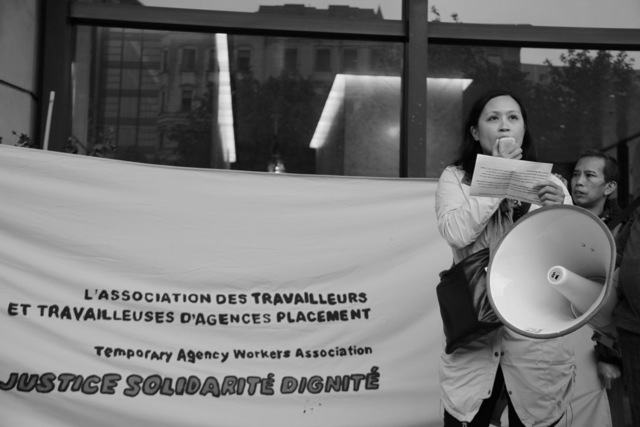Precarity as a term has come to the front of popular discussions in recent years. The most recent report by the major Canadian bank Toronto Dominion claims that part-time and temporary work is our new reality1. Yet precarity has actually always been the reality of work under capitalism since its beginning. Even in industries that people see as providing permanent or stable work, this stability is only a result of a long history of struggle by workers. One example, the auto industry, which was rife with precarious work conditions based on daily hire and fire policies, only changed as a result of the great sit down strikes in the car plants in the 1930’s during the great depression2. For capitalists, the thirst for profit always seeks to keep wages low, and workers as insecure as possible. Today, precarious work is the main tool Capital uses to skirt around the threat of workers organizing in order to secure decent employment. This has taken the form of an explosion in the use of temporary recruitment agencies in order to create a permanent low wage and easily exploitable workforce.
Few people in Montréal are aware of the central role of Temporary Recruitment Agencies (TRAs, also known as Temporary Placement Agencies), in creating labour precarity across Québec, particularly for immigrant workers. Labour precarity is a concept used to describe workers who rely on temporary, “flexible”, casual work. These workers are often not protected by basic labour standards, and are poorly paid and easily exploitable.

TRAs are a “third party” in the relationship between worker and boss. They are contracted to do the hiring, firing, payment and placement of workers instead of the employer. Employers use TRAs to avoid directly contracting their own employees, and subsequently, the legal and economic obligations that come with having workers. There are currently more than five hundred legal TRAs in Montreal, and many many more working without an operating license.
The industry of TRAs has grown rapidly over the last fifteen years, as has thus their importance in the overall labour market. Their considerable place in the labour market means that TRAs are normalizing labour precarity in Québec— and they are doing so through taking advantage of the legal and social status of their workers, whether they be poor, undocumented, or single mothers.
The driving force of TRAs is to provide the cheapest labour possible. TRAs offer this “cheap product” by exploiting workers’ conditions of vulnerability— most often derived from their immigrant and social statuses. TRAs also take advantage of these workers’ lack of proficiency in English and/or French, lack of or less access to social and health protection (in the case of refugees, refugee claimants and undocumented people), lack of knowledge of workers' basic rights and labour laws, lack of recognized education, skills and diplomas, lack of work permits, or the existence of closed work permits tied to one single employer. Immigrant workers are treated as replaceable and upgradeable resources who are willing to work under any conditions. They are expected to renounce their social status and education, hiding their qualifications to adapt to the lowest rungs of the labour market. Many of these circumstances are produced, both directly and indirectly, by Québec and Canadian migration policies.
TRAs, and the employers they contract, milk these situations. Standard forms of labour abuse when working through a TRA include no payment for work hours, vacations, extra hours, break times, lunch times, and holidays. Delayed payments are common, as well as not being paid at all, no reimbursement for work equipment, insufficient safety and health standards, different pay and labour conditions compared to Québecois or permanent workers, getting paid less than minimum wage, no breakdown of salary information, intensive and exploitative work pace, requiring workers to be immediately available at any time, lack of recognition of skills and education, lack of transparency in contract conditions, payment evasion, racist, sexist and discriminatory practices at work, impossibility of unionizing, no respect for break and lunch times, and much more. All these conditions represent businesses’ savings and lower operating costs. Voilà! This is the reason for the existence of TRAs!
Despite these injustices, the authorities’ lack of attention to TRAs’ abuses is astonishing. The current Québec labour code does not guarantee respect for immigrant workers’ rights, and there are no specific regulations on TRAs’ activities. Is this lack of attention related to the fact that many sectors of Québec’s businesses survive thanks to immigrant’s precarious and cheap labour? Labour abuses perpetrated by, and made possible by TRAs, are countless, and are increasing as well. However, the authorities’ lack of political will seems to be based on Quebec's capitalist economy's need for this exploitation as a question of ensuring its very survival.
Viviana Medina and Manuel Salamanca Members of the Temporary Agency Workers Association (TAWA) of Montreal
Notes :
1. https://go.td.com/19U1w0k. Note that banks are concerned about precarity, as precarious workers are less likely to buy lucrative mortgages and personal loans.
2. In Canada, it took the massive Windsor strike of 1945 to obtain significant gains in the auto industry. See https://en.wikipedia.org/wiki/Ford_Strike_of_1945
